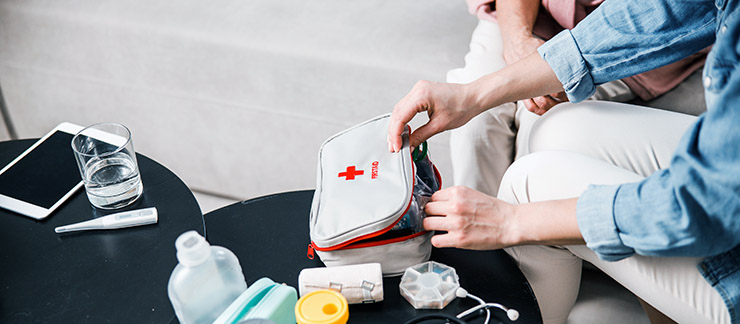
Home First Aid Kit Needs for Seniors
Caring for a senior loved one in the comfort of their home requires thoughtful preparation, including having an emergency medical file and a well-stocked first aid kit available for unexpected health challenges or urgent situations.
Your senior loved one, just like anyone else, may encounter minor injuries, sudden illnesses, or other health issues that require immediate attention. A properly stocked first aid kit in their home can help ensure you and other caregivers have access to the required supplies when needed.
First Aid Kit Essentials for Seniors
The first items you should stock in any first aid kit are the “essentials”—the items commonly needed for most minor health occurrences. Supplies (in alphabetical order) include:
- Anti-inflammatory medication*
- Antiseptic ointment and/or wipes
- Antiseptic spray
- Band-Aids
- Blanket
- Calamine lotion*
- Cold compress
- Compact flashlight
- Cotton swabs
- Fever reducer*
- Gauze
- Gloves
- Hand sanitizer
- Hydrocortisone cream*
- Hydrogen peroxide*
- Scissors/shears
- Tape
- Thermometer
- Tweezers
If you are missing—or low—on any supplies, restock them as soon as possible.
*Check with your senior’s doctor to ensure anti-inflammatories, calamine lotion, fever reducers, hydrogen peroxide, and hydrocortisone cream are safe to use before stocking these items in the first aid kit.
Additional First Aid Kit Supplies and Documents
Depending on your loved one's health, additional supplies or specialty home care items may be necessary. Talk with your senior and their doctor to determine if they require further items due to a chronic health condition or other needs.
Make sure essential information from your loved one’s emergency medical file is included in their home first aid kit. This information includes:
- Phone numbers for doctors, pharmacy, and emergency contacts, as well as poison control
- Medical forms (i.e., DNR, advance directives, power of attorney, living will)
- List of medications, including dosage and schedule for each
- List of allergies, health conditions, and surgeries
- Insurance information
- A copy of a photo ID
Other First Aid Kit Tips for Seniors
After you’ve assessed and supplied your loved one’s home first aid kit, place it somewhere that is easy to access. Make sure the first aid kit can be easily found in an emergency, and alert anyone who visits the home regularly of its location.
Restock the kit every time an item is used. Check each item every six months to determine if anything has expired, and replace it as needed.
Professional In-Home Care Can Help
While it’s essential to have a well-stocked first aid kit available, having a professional in-home caregiver by your loved one’s side can provide an additional layer of support and safety when you or other family members are unable to be there.
Learn how your senior can benefit from having the support and companionship of a Visiting Angels caregiver in their home by contacting your local Visiting Angels to schedule a free home care consultation with a care coordinator.


